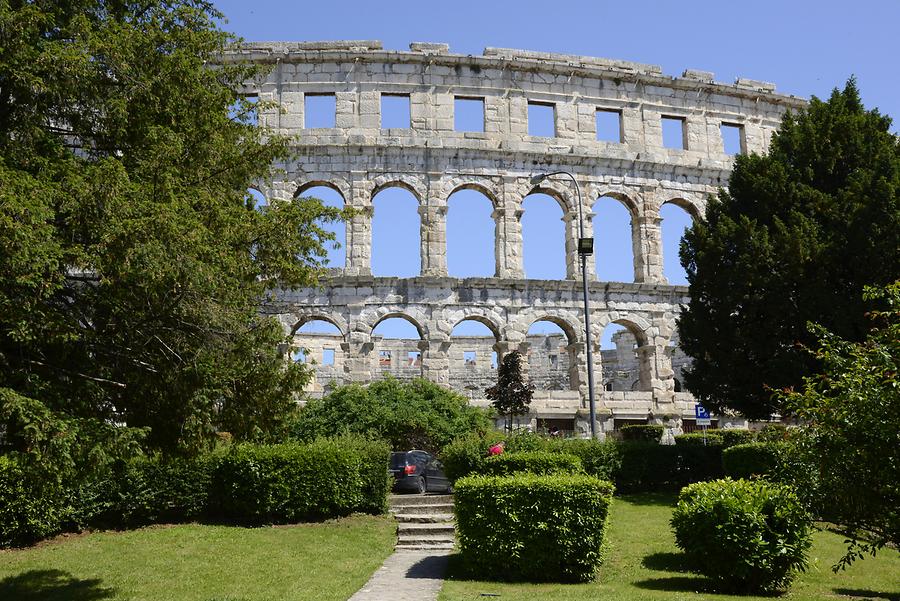Pula - Amphitheatre#

Pula - Amphitheatre, May 2016, © Gerhard Huber, under CC BY-NC 4.0 +Edu
Die geschützte Bucht von Pula war bereits zu Römerzeiten ein so geschätzter Ankerplatz, dass die antiken Baumeister hier im 1. Jahrhundert ein Amphitheater errichteten, das mit 23.000 Sitzplätzen zu den fünf größten des Reiches gehörte. Ganz im Sinne der 'Brot und Spiele'-Politik verfolgten die Zuschauer begeistert die blutigen Spektakel der Gladiatorenkämpfe und Tierhatzen. Einst rekrutierten sich die Gladiatoren aus Sklaven und Kriegsgefangenen, doch im Laufe der Zeit wählten immer mehr freie Bürger den gefährlichen Beruf. Die Zuschauer entschieden über Leben und Tod der Kämpfer – Daumen hoch oder Daumen runter. Trotzdem war der Beruf begehrt, denn die Kämpfer genossen ein feudales Leben. Sie mussten nur ein bis dreimal pro Jahr in die Arena. Auch wenn sie mit 27 Jahren eine deutlich unterdurchschnittliche Lebenserwartung hatten - sie waren ein Synonym für Tapferkeit, angebetet von den Frauen – kurz, die Popstars der Antike. Erst im 5. Jahrhundert verbot Kaiser Honorius den Gladiatorenkampf – doch in den mittelalterlichen Duellen und den modernen Boxkämpfen lebt er in veränderter Form weiter.
The sheltered bay of Pula was already such a popular anchorage in Roman times that the ancient builders built an amphitheater here in the first century. With 23,000 seats, it was one of the five largest in the empire. In the spirit of the 'Bread and Games' policy, spectators eagerly watched the bloody spectacles of gladiatorial battles and animal hunts. Once the gladiators recruited from slaves and prisoners of war, but over time, more and more free citizens chose the dangerous profession. The audience decided on the life and death of the fighters - thumbs up or thumbs down. Nevertheless, the profession was coveted, because the fighters enjoyed a feudal life. They only had to go to the arena one to three times a year. Even if they had a much lower life expectancy than the average - the age of 27 - they were synonymous with valor, worshiped by women - in short, the pop stars of antiquity. It was not until the 5th century that Emperor Honorius forbade the gladiatorial fight - but in the medieval duels and the modern boxing fights it lives on in a different form.